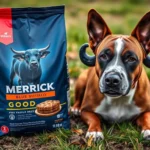
Introduction
Understanding dog nutrition is essential for every pet owner. Just as with humans, a well-balanced diet plays a crucial role in a dog’s health and well-being. With the plethora of food options available, knowing what dogs can and cannot eat is vital to prevent health issues. Among these ingredients is cornstarch, a common item found in many human foods and some dog treats. This article aims to answer the question, “Can dogs eat cornstarch?” while providing comprehensive insights into its nutritional aspects, potential benefits, and risks.
Understanding Dog Nutrition
Basics of Canine Nutrition
A dog’s diet should be well-rounded and include essential nutrients such as:
- Proteins: Critical for muscle development and repair.
- Fats: Provide energy and support cell function.
- Carbohydrates: Offer a quick energy source and aid in digestive health.
- Vitamins and Minerals: Vital for various bodily functions and overall health.
A balanced diet ensures that dogs receive all these nutrients in the right proportions, which is essential for their growth, energy levels, and overall health.
Common Food Ingredients in Dog Diets
Many ingredients are commonly found in dog foods, including:
- Grains: Such as rice and oats, which are often used as carbohydrate sources.
- Vegetables: Carrots and peas are rich in vitamins and fiber.
- Proteins: Chicken, beef, and fish provide essential amino acids.
These ingredients are chosen for their nutritional value and their ability to meet a dog’s dietary needs.
What is Cornstarch?
Definition and Composition
Cornstarch is a carbohydrate derived from the endosperm of corn kernels. It is a fine, white powder used primarily as a thickening agent in cooking and baking. Its nutritional profile is largely comprised of carbohydrates, with negligible amounts of protein and fat, making it a calorie-dense ingredient.
Uses of Cornstarch in Human Food
In the culinary world, cornstarch serves multiple purposes:
- Thickening Agent: Often used in sauces, gravies, and soups to achieve a desired consistency.
- Baking: Helps to create light and fluffy textures in cakes and pastries.
- Stabilizer: Used in puddings and custards to maintain their shape.
While it plays a significant role in human nutrition, its effects on canine diets are less clear.
Can Dogs Eat Cornstarch?
Safety of Cornstarch for Dogs
When considering whether dogs can eat cornstarch, it’s essential to evaluate its safety. Generally, cornstarch is not toxic to dogs. In small amounts, it is considered safe for consumption. However, as with any food, moderation is key.
Currently, there isn’t substantial research specifically addressing the effects of cornstarch on dogs. However, anecdotal evidence suggests that many dogs can tolerate it without significant issues.
Potential Benefits of Cornstarch
Cornstarch may provide some benefits for dogs, including:
- Energy Source: As a carbohydrate, it offers a quick energy boost, which can be beneficial during periods of high activity.
- Digestive Aid: Some owners have reported that cornstarch can help alleviate mild digestive upset when used in small, controlled amounts.
Potential Risks of Cornstarch
Despite its potential benefits, there are risks associated with feeding cornstarch to dogs, which include:
- Digestive Issues: Excessive consumption can lead to flatulence, diarrhea, or upset stomach. Dogs that are sensitive to carbohydrates may experience more pronounced effects.
- Allergies or Sensitivities: Some dogs may have grain allergies or sensitivities that could cause adverse reactions to cornstarch.
- Risk of Obesity: Since cornstarch is calorie-dense, it can contribute to weight gain if fed in excess, especially in less active dogs.
Alternatives to Cornstarch
Healthier Thickening Agents
If you’re looking for alternatives to cornstarch, consider these healthier options:
- Arrowroot: A natural thickener that is easily digestible and suitable for dogs.
- Tapioca Starch: Another great alternative that can serve similar purposes without the potential drawbacks of cornstarch.
Both of these options provide nutritional benefits while reducing the risk of digestive issues.
Whole Food Options for Dogs
Instead of using cornstarch as a thickening agent, consider incorporating whole foods into your dog’s diet. Some dog-friendly fruits and vegetables that can replace cornstarch in recipes include:
- Sweet Potatoes: Rich in vitamins and can be mashed for a thick consistency.
- Pumpkin: A great source of fiber and nutrients, it can also help with digestive health.
- Carrots: When cooked and pureed, they can add thickness to meals while providing essential vitamins.
How to Safely Introduce New Foods to Your Dog
Understanding Your Dog’s Dietary Needs
Before introducing any new food, including cornstarch, it’s crucial to understand your dog’s specific dietary needs. Factors such as age, breed, activity level, and existing health conditions can all influence what your dog should eat.
Gradual Introduction of New Ingredients
When introducing cornstarch or any new ingredient, follow these steps:
- Start Small: Begin with a tiny amount mixed into your dog’s regular food.
- Monitor Reactions: Watch for any signs of digestive upset or allergic reactions over the next 24-48 hours.
- Increase Gradually: If no adverse reactions occur, you can gradually increase the amount, keeping it in moderation.
Consulting with a Veterinarian
Always consult with your veterinarian before making significant changes to your dog’s diet. A vet can provide personalized advice based on your dog’s health history and nutritional needs.
Conclusion
In summary, while cornstarch is not toxic to dogs and can be safely consumed in moderation, it is essential to be cautious. Understanding dog nutrition allows pet owners to make informed choices about what to feed their furry friends. If you decide to include cornstarch in your dog’s diet, do so sparingly and monitor for any adverse reactions. Remember to prioritize a balanced diet rich in proteins, fats, and whole food sources to ensure your dog’s optimal health.
Frequently Asked Questions (FAQs)
Can dogs eat cornstarch in moderation?
Yes, dogs can eat cornstarch in moderation. It is not toxic, but excessive amounts can lead to digestive issues.
What should I do if my dog accidentally eats cornstarch?
If your dog accidentally consumes cornstarch, monitor them for any signs of digestive upset. If they exhibit unusual symptoms, contact your veterinarian.
Are there any foods that dogs should completely avoid?
Yes, certain foods are toxic to dogs, including chocolate, grapes, onions, garlic, and xylitol. Always research any new food before introducing it.
How can I ensure my dog has a balanced diet?
To ensure your dog has a balanced diet, consult with a veterinarian about appropriate food choices, include a variety of proteins, fats, and carbohydrates, and avoid excessive treats. Regular monitoring of your dog’s health and weight is also essential.









